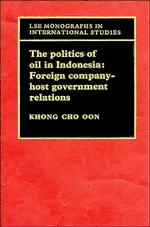Book contents
- Frontmatter
- Contents
- List of figures
- Acknowledgments
- 1 THE IMPACT OF THE FOREIGN COMPANY ON GOVERNMENT POLICIES IN LESS-DEVELOPED COUNTRIES
- 2 THE INDONESIAN PETROLEUM INDUSTRY: FORM AND CONTENT OF AGREEMENTS
- 3 FINANCIAL PROVISIONS AND CONSEQUENT AREAS OF DISPUTE
- 4 PROVISIONS FOR DEVELOPMENT AND NATIONAL CONTROL
- 5 PROBLEMS OF NEGOTIATION AND CONTRACTUAL CHANGE
- 6 ORGANISATIONAL STRUCTURE AND THE NEGOTIATING PROCESS
- 7 SOME REGIONAL CONSIDERATIONS FOR SOUTHEAST-ASIAN OIL-PRODUCER GOVERNMENTS
- 8 THE VIABILITY OF TRANSNATIONAL MINERAL AGREEMENTS
- Notes
- Select bibliography
- Index
4 - PROVISIONS FOR DEVELOPMENT AND NATIONAL CONTROL
Published online by Cambridge University Press: 05 November 2011
- Frontmatter
- Contents
- List of figures
- Acknowledgments
- 1 THE IMPACT OF THE FOREIGN COMPANY ON GOVERNMENT POLICIES IN LESS-DEVELOPED COUNTRIES
- 2 THE INDONESIAN PETROLEUM INDUSTRY: FORM AND CONTENT OF AGREEMENTS
- 3 FINANCIAL PROVISIONS AND CONSEQUENT AREAS OF DISPUTE
- 4 PROVISIONS FOR DEVELOPMENT AND NATIONAL CONTROL
- 5 PROBLEMS OF NEGOTIATION AND CONTRACTUAL CHANGE
- 6 ORGANISATIONAL STRUCTURE AND THE NEGOTIATING PROCESS
- 7 SOME REGIONAL CONSIDERATIONS FOR SOUTHEAST-ASIAN OIL-PRODUCER GOVERNMENTS
- 8 THE VIABILITY OF TRANSNATIONAL MINERAL AGREEMENTS
- Notes
- Select bibliography
- Index
Summary
THE EXTRACTIVE OPERATION AS PART OF OVERALL DEVELOPMENT
Integrating the contribution of the petroleum sector with general plans for economic development has become a matter of growing concern to producer governments in charge of significant petroleum industries. In examining the terms of Indonesian oil agreements, we are here concerned with those provisions which are aimed at compelling the foreign company to engage in activities which directly benefit the wider national economy. In so doing, the government's attempts at asserting its authority over the extractive process through various control and supervisory measures will also be assessed.
Despite the notable increases in the world price of crude oil since 1973, producer countries have not necessarily believed that they have profited from the rise in value of their resources to a commensurate extent in terms of material benefits for their domestic society and economy. What host governments have wanted goes beyond seeking still higher prices for petroleum products or improved terms of trade between raw material prices and the prices of imported manufactured goods. They require a broader range of benefits, not necessarily quantifiable in financial terms, which derive from extractive operations within their economies. Such attendant benefits are by no means a novelty. Many producer governments have, for some time already, taken various limited measures aimed at widening and increasing the contribution to development made by foreign petroleum companies.
- Type
- Chapter
- Information
- The Politics of Oil in IndonesiaForeign Company-Host Government Relations, pp. 90 - 128Publisher: Cambridge University PressPrint publication year: 1986

